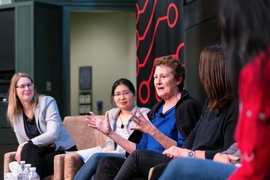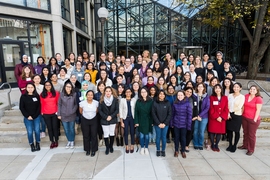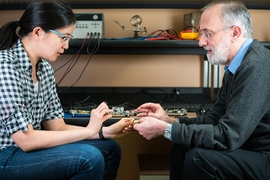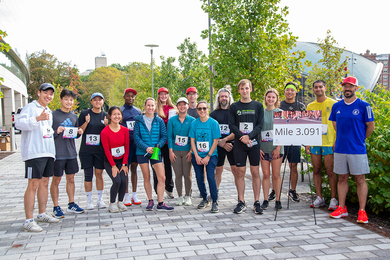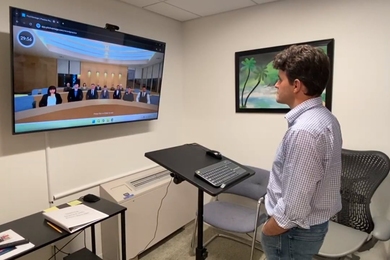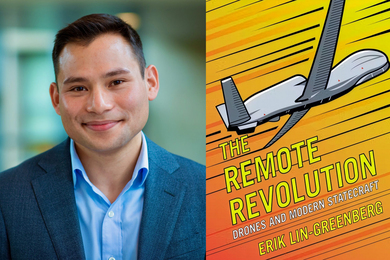Vivienne Sze, an associate professor in the Department of Electrical Engineering and Computer Science (EECS), has received the 2018-2019 Harold E. Edgerton Faculty Achievement Award.
The award, announced at today’s MIT faculty meeting, commends Sze for “her seminal and highly regarded contributions in the critical areas of deep learning and low-power video coding, and for her educational successes and passion in championing women and under-represented minorities in her field."
Sze’s research involves the co-design of energy-aware signal processing algorithms and low-power circuit, architecture, and systems for a broad set of applications, including machine learning, computer vision, robotics, image processing, and video coding. She is currently working on projects focusing on autonomous navigation and embedded artificial intelligence (AI) for health-monitoring applications.
“In the domain of deep learning, [Sze] created the Eyeriss chip for accelerating deep learning algorithms, building a flexible architecture to handle different convolutional shapes,” the Edgerton Faculty Award selection committee said in announcing its decision. “Eyeriss is also the first deep neural network accelerator to exploit data statistics of the network to further reduce energy consumption twofold, a substantial accomplishment in this field.” In addition, the committee noted that Sze’s work on High Efficiency Video Coding (HEVC) influenced the development of standards now in widespread use, including the improvements that provide the enabling technology for video-accessing on iPhones and Android phones worldwide.
Sze’s educational contributions include a popular conference tutorial on hardware architectures for deep neural networks, which she has turned into a regularly offered MIT subject that can be used to satisfy the EECS doctoral qualifying procedures. In addition, students praise “her ability to connect theory and practice through enjoyable and helpful lectures,” the selection committee noted.
Finally, the committee acknowledged Sze’s efforts in promoting the inclusion and advancement of women and under-represented minorities in the field. Most recently, she served as a technical co-chair of Rising Stars in EECS 2018, which brought 76 of the world’s top women graduate students and postdoctoral researchers to MIT for an intensive two-day workshop on academic careers. (As a PhD student, Sze participated in the inaugural Rising Stars in EECS workshop, held at MIT in 2012.)
Sze received a bachelor’s degree with honors from the University of Toronto and a master’s degree and PhD from MIT, all in electrical engineering. From 2010 to 2013, she was a member of the technical staff in the R&D Center at Texas Instruments (TI), where she designed low-power algorithms and architectures for video coding. In that role, she represented TI on the Joint Collaborative Team on Video Coding during the development of HEVC, which later received an Engineering Emmy Award. Sze returned to MIT in 2013 as an assistant professor of electrical engineering and computer science and was promoted to associate professor without tenure in July 2017. She is also a principal investigator in the Research Lab of Electronics, has co-authored more than 60 publications in proceedings of refereed conferences and journals, and holds more than 25 issued patents.
Other honors include a 2018 Google Faculty Research Award, a 2018 Facebook Faculty Award, a 2018 Qualcomm Faculty Award, and a 2016 Young Investigator Research Program Award from the Air Force Office of Scientific Research, among others. In 2011, she received MIT’s Jin-Au Kong Outstanding Doctoral Thesis Prize in Electrical Engineering.
The annual Edgerton Faculty Award was established in 1982 as a tribute to Institute Professor Emeritus Harold E. Edgerton in recognition of his active support of junior faculty members. Each year, a committee presents the award to one or more non-tenured faculty members to recognize exceptional contributions in research, teaching, and service.
The 2018-2019 Edgerton Award Selection Committee was chaired by Professor Ian Hunter, the George N. Hatsopoulos Professor in Thermodynamics in the Department of Mechanical Engineering. Committee members included Catherine Drennan, professor of chemistry and biology; Jay Scheib, Class of 1949 Professor of Theater; Antoinette Schoar, the Michael M. Koerner (1949) Professor of Finance and Entrepreneurship at the MIT Sloan School of Management; and Andrew Scott, professor of architecture and urbanism.

